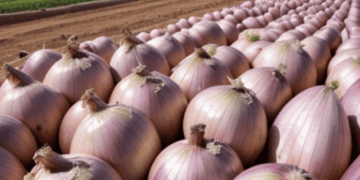The political turmoil in Niger has had far-reaching impacts on the food supply chain in West Africa, particularly affecting onion prices in Ghana. Yakubu Akteniba, an onion seller at Adjen Kotoku market near Accra, has experienced a significant decline in business since early August, with the number of truckloads of onions arriving at the market dropping drastically. This decline is a direct consequence of the sanctions imposed by the Economic Community of West African States (ECOWAS) following a coup in Niger on July 26.
Niger, a significant onion exporter in the region and a member of ECOWAS, saw its borders closed as part of the sanctions. This move has severely disrupted the supply of onions and other commodities, leading to a shortage and a steep increase in prices. The price of a 100kg sack of onions in Ghana, for example, has almost doubled from $61 to $105. This surge in prices is particularly concerning given the vital role onions play in West African cuisines and their nutritional value.
Niger was responsible for almost two-thirds of the region’s onion exports in 2021, with Ghana being one of its main buyers. Ghana’s reliance on imports for its onion supply, with 70 percent previously coming from Niger, has been highlighted by this crisis. The Food and Agriculture Minister of Ghana, Bryan Acheampong, has expressed concern over this dependency and the strain it places on the country’s foreign exchange reserves. The government is working on a plan to increase local production and reduce reliance on imports.
The ongoing political situation in Niger and the ensuing sanctions have raised alarms about a potential food security crisis in the region. The situation is exacerbated by insecurity and attacks on transport trucks, particularly in areas affected by armed groups in the Sahel. Experts and trade advocates are urging ECOWAS to reconsider the sanctions, emphasizing the importance of maintaining regional trade flows and the need for policies to hold countries accountable while facilitating dialogue in times of crisis.
In Ghana, the impact of the crisis is felt not only by traders but also by consumers who are cutting back on onion usage due to rising costs. The situation serves as a wake-up call for the Ghanaian government to invest in local agriculture, despite challenges such as the smaller size of locally grown onions compared to those from Niger. The crisis underscores the need for regional cooperation and the development of resilient local supply chains to ensure food security in West Africa.
Catch the latest supply chain news at The Supply Chain Report. Learn more about international trade at ADAMftd.com with free tools.
#NigerCrisis #ECOWASSanctions #OnionPriceSurge #WestAfricaFoodSecurity #GhanaOnionCrisis #RegionalTradeFlows #LocalAgricultureInvestment #FoodSecurityInAfrica #GhanaMarketChallenges #OnionSupplyDisruption #SahelInsecurity #GhanaEconomy #RegionalCooperation #OnionSupplyCrisis #NigerExports #AgricultureResilience















